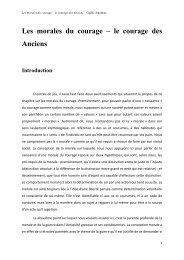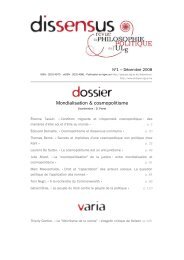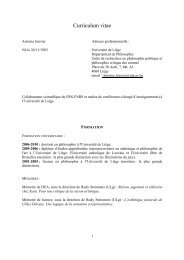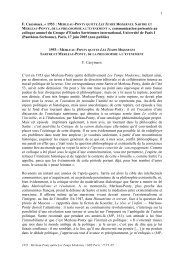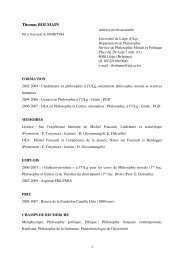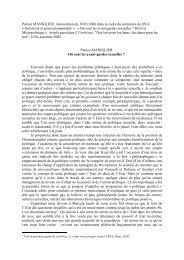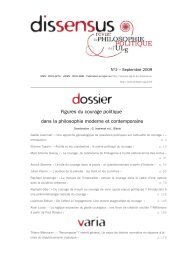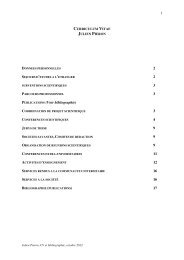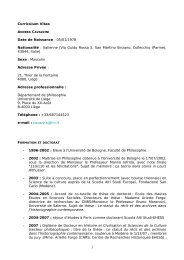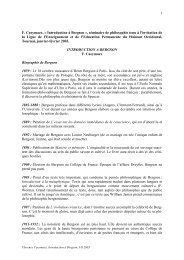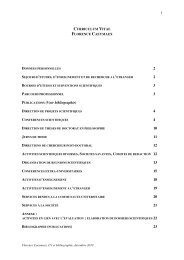Subjectivations politiques et économie des savoirs - Service de ...
Subjectivations politiques et économie des savoirs - Service de ...
Subjectivations politiques et économie des savoirs - Service de ...
Create successful ePaper yourself
Turn your PDF publications into a flip-book with our unique Google optimized e-Paper software.
– Revue <strong>de</strong> philosophie politique <strong>de</strong> l’ULg – N°5 – Mai 2013 – p. 134<br />
exactly as far from dying fighters as from amused sows ». That, however, is<br />
mediocrity, though it be called mo<strong>de</strong>ration 46 .<br />
But Socrates is clear: true mo<strong>de</strong>ration need not mean simple-min<strong>de</strong>dness or<br />
mediocrity. It can <strong>de</strong>note « the sort of fine and good character that has <strong>de</strong>veloped in<br />
accordance with an intelligent plan » (Republic 400e). For Plato, it is frenzy and extreme<br />
<strong><strong>de</strong>s</strong>ires that can be dull and senseless – not mo<strong>de</strong>ration. Moreover, in answer to the<br />
Ni<strong>et</strong>zschean concern that mo<strong>de</strong>ration could lead to slavery, it must be said that Plato<br />
was keenly aware of the risks posed by an excess of sophrosyne for virtue and civic<br />
liberty. In the Statesman, for instance, we learn that when mo<strong>de</strong>rate individuals are in<br />
office, they can be too cautious, lacking « bite, and a certain sharp and practical<br />
keenness » (311a). In<strong>de</strong>ed, when severed from courage, the virtue of mo<strong>de</strong>ration can<br />
be hazardous: it can compromise a polis’ freedom. It is thus for this reason that Plato<br />
counsels statesmen to « weave tog<strong>et</strong>her » mo<strong>de</strong>rate citizens (who can be too pru<strong>de</strong>nt<br />
and gentle) with courageous ones (who can be too brash and bold). Similar advice is<br />
given in the Laws, when the Athenian argues that Magnesia should do all it can to<br />
encourage marriages b<strong>et</strong>ween individuals of different temperaments. 47<br />
What I have argued thus far is that it is inappropriate to equate Platonic sophrosyne too<br />
quickly with asc<strong>et</strong>icism, conservatism, female chastity or spinelessness. While not<br />
entirely unjustified, some of these associations do little justice to the richness of<br />
Plato’s account of mo<strong>de</strong>ration. In the next section, I intend to address further the<br />
criticism (raised by the likes of Wood and Villa) that mo<strong>de</strong>ration necessarily leads to<br />
the reinforcing of existing hierarchies, by discussing a few things that the realization of<br />
a politics of mo<strong>de</strong>ration would entail. A compl<strong>et</strong>e consi<strong>de</strong>ration of this matter is<br />
obviously beyond the scope of this paper. I will therefore only focus on two ingredients<br />
of Plato’s politics of mo<strong>de</strong>ration which I consi<strong>de</strong>r to be central: music education and<br />
state legislation regarding wealth and commerce. 48<br />
As should become clear to my rea<strong>de</strong>rs in the following pages, I take seriously Plato’s<br />
utopianism. Since I do not have the space required to fully address the complex<br />
interpr<strong>et</strong>ative issue raised by Plato’s political « prescriptions », I will limit myself to<br />
claiming that an interpr<strong>et</strong>ative position can be found b<strong>et</strong>ween that which sees Plato’s<br />
radical reforms as a « joke » (or as a way for him to un<strong>de</strong>rscore the danger of utopian<br />
46<br />
47<br />
48<br />
F. Ni<strong>et</strong>zsche, Thus Spoke Zarathustra, p. 170.<br />
« It is infinitely b<strong>et</strong>ter for the virtue of a man and wife if they balance and complement each other than<br />
if they are both at the same extreme » (Laws 773a-e). This intermarrying of character (and social<br />
classes) will not be obtained through the forceful compulsion of law, but via the gentle persuasion of<br />
« charms » (i.e. songs).<br />
And which Plato also consi<strong>de</strong>red to be central: see for instance Republic 404e & 424c, and Laws 669-<br />
670 & 836a.



